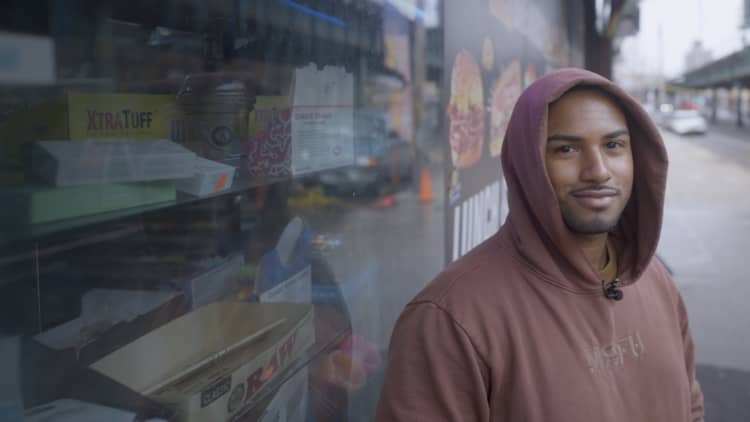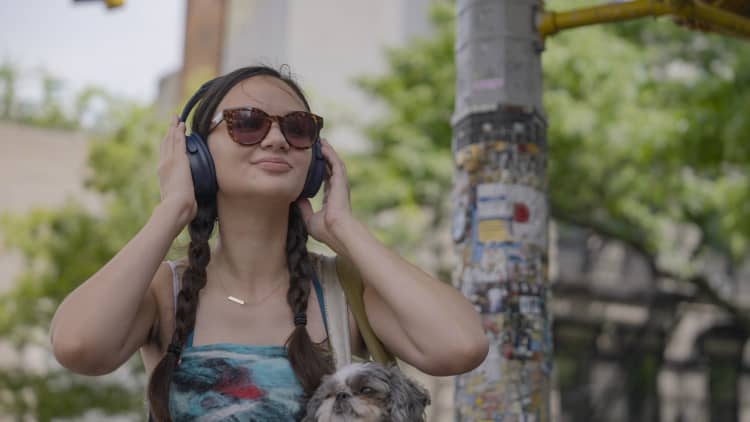This story is part of CNBC Make It's Millennial Money series, which details how people around the world earn, spend and save their money.
In 2018, Kate Brunotts moved to New York City right after graduating from high school to pursue her dream of working in music production.
While growing up in a suburb of Washington, D.C., Brunotts always expected to go to college. But after reviewing the potential costs of attending music school in NYC, she ultimately decided against pursuing higher education.
"I didn't really want to go into debt," she tells CNBC Make It. "There was definitely some social resistance, I would say. But at the end of the day, I was like, 'I've got to make the right decision for me.'"
However, she knew she still wanted to move to New York, so at 15, she began working after school as a cashier at Wegmans, walking dogs and teaching music lessons in order to save up to move. By the time she graduated at 18, she had amassed around $10,000.
Now 23, Brunotts works as a freelance music producer and audio engineer. She brought in around $48,000 last year and says she's on track to make more this year.
Getting started in NYC
Although Brunotts' $10,000 in savings felt like a lot, she quickly realized it wouldn't be enough to sustain her for long. "I was so excited to be here. But it was tight," she says.
She found work as a barista, walked dogs and picked up an additional job at Guitar Center to make ends meet while producing music on the side. During her first two years in New York, she only earned around $20,000 a year, she says.
Then she met her partner, Matt, who introduced her to freelancing. "I didn't know that that was a path that could exist, especially for someone like me who hadn't really pursued any higher education," Brunotts says.
Brunotts began finding gigs through Upwork, a platform that connects freelancers with clients. She booked various jobs, including writing articles for a blog about dogs and creating meditation and instrumental music.
Although she was getting paid to produce music, she wasn't making a lot of money.
"One time, I made an hour of music and earned maybe $20," she says. "It was really bad."
But Brunotts kept at it. As she built up her portfolio and technical skills, she was able to increase her rates and take on more gigs. Currently, she has eight clients and provides a number of services, including copywriting, technical writing, podcast production and music production.
As a copywriter, Brunotts develops marketing slogans and writes blogs posts for brands, and as a technical writer, she helps create manuals that provide directions on how to use certain products.
However, first and foremost, she's a music producer, she says, which involves producing the tracks that artists sing over. "All the sounds that you hear behind the vocals, so like the pianos, the sound effects, all of those things, I am building the beats there."
Brunotts usually works Monday through Friday, aiming to keep her weekends free to work on her own projects. She typically charges $45 to $55 per hour, depending on whether or not she's using her own equipment. Additionally, she factors in the 10% service fee Upwork charges freelancers who book clients through its platform.
Dealing with an unpredictable income
While Brunotts enjoys being able to control her own schedule, two of the biggest disadvantages of freelancing are having inconsistent income and needing to constantly look for work, she says.
"With freelancing, it can be really hard to predict your income," she says. "Which is why it's so important to save anything that you can for a rainy day or for those drier months."
Brunotts usually works on projects for at least two of her clients each day and aims to earn around $1,200 a week, or $4,800 a month. This can involve editing podcast episodes, producing meditation music, writing for blogs about music production and helping her clients set up their own studios.
Some months, she brings in far more: In April and May, she made about $6,700 and $7,150, respectively.
Earning more than her weekly goal allows Brunotts space to work on personal projects. Once she hits $1,200 in a week, she'll often try not to take on more work so she can spend time producing, singing and performing her own songs.
"It's important, at least where I am at now, to have that separation between art and what I do to survive and sustain myself," she says. "Decoupling that has really benefited me. And I think it benefits my art too, because I know at the end of the day my expression is not dependent on its perceived value in the outside world."
How she spends her money
Here's how Brunotts spent her money in April 2023.
- Discretionary: $1,200 for travel to visit parents, Target, pet insurance and Amazon purchases
- Housing and utilities: $1,150 for her portion of the rent and utilities shared with her partner
- Studio time: $818 for recording and mixing music she makes herself
- Food: $598 for per portion of the groceries and dining out expenses shared with her partner
- Roth IRA contribution: $542
- Transportation: $247 for subway rides, Lyfts and Citi Bike
- Phone: $74 for Google Fi wireless plan
Brunotts also helped her partner cover $1,800 in tax payments this spring.
After living with her partner for two years, it felt inconvenient for them to keep sending each other money through Venmo, she says. They decided to open a joint bank account, which they use to cover most household expenses.
Brunotts maintains a personal account as well, and aims to keep at least $1,000 there at all times. She has one credit card, which she uses for most purchases in order to earn cash-back rewards, and is sure to pay it off in full each month.
She still allows herself small treats though. "My one splurge is I budget for a bubble tea every week because I'm so passionate about it and it's amazing," she says.
Time is such a huge asset. It's not necessarily what you make, but it's what you do with it.
One of Brunotts' main money goals is to save for retirement, and she has nearly $9,000 stashed in her Roth IRA as of June 1. "Because I'm freelance, I don't have a 401(k) or any sort of retirement match, so I really need to be proactive and save for that myself," she says.
"Time is such a huge asset. It's not necessarily what you make, but it's what you do with it. I've always been super conscious about setting aside whatever I can for retirement."
Her future in music and beyond
Brunotts is open-minded about what her future as a music producer and artist may look like.
While it would be nice to create and perform her own music full time, she recognizes that it would also come with financial challenges. "You could be getting a million streams per month and just be above the poverty line because of the way that streaming culture has decimated artists earnings," she says.
She hasn't ruled out eventually getting a salaried job and making music on the side — especially since she's currently covered by her family's health insurance plan.
Because health care can be so expensive for freelancers, "I can definitely see that alone being a very big pull to something more traditional," she says.
Going forward, Brunotts would like to earn at least $45,000 a year in order to build up her savings and invest in her art. But for now, she feels very lucky to be making the amount of money she does.
"When I first moved to New York, it was so tight and stringent," she says. "If I end up being at this level for a very long time, but it still allows me to save and do what I love, then I think I could definitely be happy with that."
What's your budget breakdown? Share your story with us for a chance to be featured in a future installment.
DON'T MISS: Want to be smarter and more successful with your money, work & life? Sign up for our new newsletter!
Get CNBC's free Warren Buffett Guide to Investing, which distills the billionaire's No. 1 best piece of advice for regular investors, do's and don'ts, and three key investing principles into a clear and simple guidebook.
CHECK OUT: 26-year-old lives on $27,000 a year in Seattle: 'I feel very grateful that I'm making that much'




